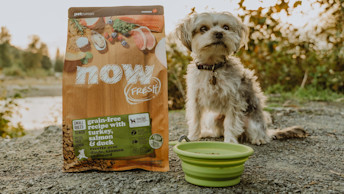October 21, 2024
At What Age is a Dog Considered a Senior?

What Age is a Senior Dog?
The term "senior dog" refers to a dog that has entered the later stage of its life. However, determining at what age is a dog considered a senior is not as straightforward as it may seem.
The age at which a dog becomes a senior varies depending on its breed size and type. Generally, smaller breeds tend to have longer lifespans compared to larger breeds. As a result, they are typically considered senior at an older age.
Senior Years by Breed Size
- Toy and small breed dogs, such as Chihuahuas, Yorkies, and Maltese, can be classified as senior as early as 9 years of age.
- Medium-sized breeds, like Beagles, Cocker Spaniels, and Bulldogs, enter their senior years around 7 years old.
- Large and giant breeds, such as German Shepherds, Labrador Retrievers, and Great Danes, enter their senior years around 5 years of age.
It's important to note that these age ranges are approximate guidelines, and individual dogs may show signs of aging earlier or later than the typical timeframe for their breed size. Factors such as genetics, diet, exercise, and overall health can influence when a dog begins to exhibit signs of aging and enters the senior life stage.
What is Considered a Small Breed Dog and When Do They Become Seniors?
Small breed dogs are typically those under 20 pounds. They’re considered seniors at a younger age compared to larger breeds. Many small breeds reach their senior years around 9 years old.
Popular small breeds like Chihuahuas, Yorkshire Terriers, Pomeranians, and Shih Tzus tend to have longer lifespans but still enter their golden years relatively early. For these petite pups, signs of aging may start to appear as early as 6 or 7 years old. Lower energy levels, gaining weight, and developing joint issues are common indicators that your small breed dog is entering their senior stage. It's essential to monitor their diet, exercise routine, and overall health closely during this transition period to ensure they remain happy and comfortable in their later years.

Our Recommendation
Small Breed Senior Dog Food
We're committed to helping our elderly pint-sized pals lead happy, healthy lives. Served in a tiny kibble for smaller mouths and crafted with parsley and peppermint to support fresh breath.
View recipeFor the In-Betweeners: Medium Breed Dogs
For dogs weighing between 21-50 pounds at their adult weight, the senior years typically begin around 7 years of age. Popular medium breed dogs like Beagles, Bulldogs, Border Collies, and Basset Hounds often fall into this category.
As medium breeds age, they may start showing signs of having less energy, and taking longer to recover from activity. Their nutritional needs may also change, and they may benefit from a diet tailored for less active, senior dogs. It's important to work closely with your veterinarian to make the transition to senior dog food at the appropriate time based on your individual dog's breed, size, and health condition.

Our Recommendation
Senior Dog Food for All Breed Sizes
Healthy nutrition is the key to aging gracefully, and we're here to help. Expertly crafted for senior dogs and suitable for all breed sizes, including medium sized breeds.
View recipeProviding proper exercise, a nutritious senior diet, and regular veterinary care will help your medium breed dog stay healthy and happy during their golden years. With some adjustments to their lifestyle and routine, these wonderful companions can thrive as seniors.
What is Considered a Large Breed Dog and When Do They Become Seniors?
Large breed and giant breed dogs are those weighing more than 50 pounds. For large breed dogs like Golden Retrievers, Labrador Retrievers, and German Shepherds, senior status can begin as early as 5 years old.
These breeds are considered large due to their substantial size and weight, which can put more strain on their joints and bones as they age. As a result, many large breed dogs start showing signs of aging earlier than their smaller counterparts. It's important to keep a close eye on your large breed dog's mobility, energy levels, and overall health as they approach their senior years.
Adjusting their diet, exercise routine, and living environment to accommodate their changing needs can help them maintain a good quality of life well into their golden years.

Our Recommendation
Large Breed Senior Dog Food
Large and giant breed dogs' nutritional needs change as they mature, and we must take extra care of their health. Specially crafted for big dogs, with added glucosamine and chondroitin for joint support.
View recipeSigns Your Dog is Becoming a Senior
As dogs age, they often exhibit physical and behavioral changes that signal their transition into the senior life stage1. Being aware of these signs can help you provide the appropriate care and adjustments to ensure your furry companion's well-being.
Signs of Aging in Dogs:
- Graying fur around the muzzle and face
- Loss of muscle tone and increased weight gain
- Stiffness or difficulty in movements, such as climbing stairs or getting into the car
- Decreased stamina and increased fatigue during walks or playtime
- Hearing and vision impairment
Recognizing these signs early on can help you make necessary adjustments to your dog's diet, exercise routine, and living environment, ensuring they maintain a good quality of life as they age gracefully.
Transitioning to Senior Dog Food
As dogs age, their nutritional needs change significantly. Senior dogs have different dietary requirements compared to their younger counterparts, and transitioning to a senior dog food formula can be helpful for maintaining their overall health and well-being. One of the primary reasons for switching to senior dog food is the change in energy requirements. As dogs grow older, their metabolism slows down, and they often become less active. Senior dog foods are formulated with fewer calories to prevent unnecessary weight gain and obesity risks, which can lead to secondary health issues such as joint problems, diabetes, and respiratory difficulties.

Additionally, senior dogs may experience a decline in their ability to digest and absorb nutrients efficiently. Senior dog foods may contain different sources and combinations of high-quality, easily digestible proteins and fats to account for this decrease in digestive efficiency. These nutrients are essential for maintaining muscle mass, supporting a healthy immune system, and promoting overall vitality.
Another important consideration is the increased risk of certain age-related conditions in senior dogs, such as kidney disease, cognitive decline, and joint problems. Senior dog foods are formulated with specific nutrients and supplements to support these areas of concern. For example, they may contain increased levels of antioxidants to combat oxidative stress, glucosamine and chondroitin for joint health, and omega-3 fatty acids for cognitive function.

Our Recommendation
Grain-Free Senior Dog Food for the Young at Heart
Nurture your elderly pal's wellbeing with our senior dog food recipes. Crafted with fresh meats and fish and nutrient-rich fruits and veggies for fantastic flavor and minimally processed nutrition.
View all senior dog foodTo ensure a smooth transition, be sure to gradually introduce the new senior dog food over a minimum period of 10 days. Start by mixing a small amount of the new food with your dog's current diet, and gradually increase the proportion of the senior food while decreasing the amount of the old food. This gradual transition helps prevent digestive upset and allows your dog's system to adjust to the new formula.

Ryan Llera, BSc, DVM; Lynn Buzhardt, DVM, "How Old is Old? Comparing Dog Age to Human Age," VCA Canada, last modified date unknown, accessed September 3, 2024, https://vcacanada.com/know-your-pet/how-old-is-old-comparing-dog-age-to-human-age.


